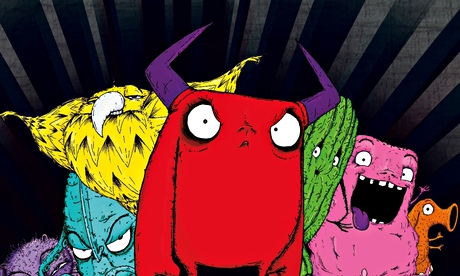
Middle-years books are often the last bastion of the goofy adventure, before sexy teen vampires and Robert Muchamore kick in. Two of this spring’s caper-thrillers are particularly great exemplars. The Deadly 7 (Macmillan £6.99) is director Garth Jennings’s first foray into kids’ books after making pop videos and The Hitchhiker’s Guide to the Galaxy. The plot of the book is so outlandish you struggle to see how anyone could film it: a child called Nelson lands on an archaic machine built by Christopher Wren to extract deadly sins from the soul.
Nelson’s sins manifest themselves as a gang of mischievous monsters and together they set off to rescue Nelson’s beloved half-sister, Celeste, who has gone missing on a school trip. Hunted by a zombie in a sunhat who can teleport itself, they end up in Brazil and discover the river of life itself. Worried Catholics should note that lust is rendered here as a graspier kind of greed and love conquers all in this zany page-turner.
Even better is Frank Cottrell Boyce’s latest offering The Astounding Broccoli Boy (Macmillan £10.99). Rory Rooney’s arch-nemesis is school bully Grim Komissky, with whom he reluctantly forges an alliance when they both turn bright green and are confined to a hospital isolation unit. Convinced they have super-powers, Rory and Grim go on a rampage through London, itself gripped by a cat flu epidemic. Boyce’s writing is both original and accessible and often laugh-out-loud funny, paying homage to Marvel comics with its in-depth analyses of heroics.
The theme of making friends of enemies continues in two more novels. Emily Sparkes and the Friendship Fiasco (Little, Brown £6.99), the first in a series by debut author Ruth Fitzgerald, finds Emily upstaged by a new baby sister and friendless after her bestie has moved to Wales. It’s more satisfying than much junior chick-lit, as Emily rolls her eyes at adult foibles (baby travel systems) and tries to do right (by her old friend, and her Tudor architecture homework) while trying to lure snobby new girl Chloe into being her school trip partner.
In How to Fly with Broken Wings (Hodder £6.99), by contrast, we’re on a London estate during the riots. The lives of the literally-minded Willem, bully and gang member Finn, and Sasha, who is caught between the two, are torn down and remade by an enthusiastic mechanic in a nuanced and serious story told in child-like fits and starts by multiple narrators. Author Jane Elson won much applause for her debut, A Room Full of Chocolate, and you can see why.
As genres go, political satire in translation has not been a big seller in the UK children’s market. One book might change that. The Disappearing Children (Phoenix Yard £10.99) by former footballer Lars Joachim Grimstad, a friend of Jo Nesbo’s, is a pacy, oddly cheerful thriller that doesn’t feel subtitled or dutiful.
Finn’s dad – a taxi driver – has become PM of Norway, but that’s not the strangest thing that’s going on. Finn has suddenly acquired an adopted brother and his schoolmates are disappearing. With only a national quiz competition as a distraction, Finn and his friends turn detective and uncover a far-reaching conspiracy. I know one 10-year-old who couldn’t put it down.
Is it a parent’s job to protect their offspring, keeping things light, or to teach them about man’s inhumanity to man? Another book in translation for the first time, The Whale That Fell in Love with a Submarine (Pushkin Press £9.99) by the celebrated author Akiyuki Nosaka, marks the 70th anniversary of Japan’s surrender in 1945 and, despite being a series of children’s short stories, bears unapologetically brutal witness to the senselessness of war.
These are tales of doomed friendships – girl and wolf, boy and parrot, whale and submarine – set against a backdrop of firebombed villages and desperate hunger. The orphaned author, aged 14 in 1945, watched his own sister die of malnutrition; he has never forgiven the grown-ups for bringing a war that children paid for. His work deserves a wide audience.

